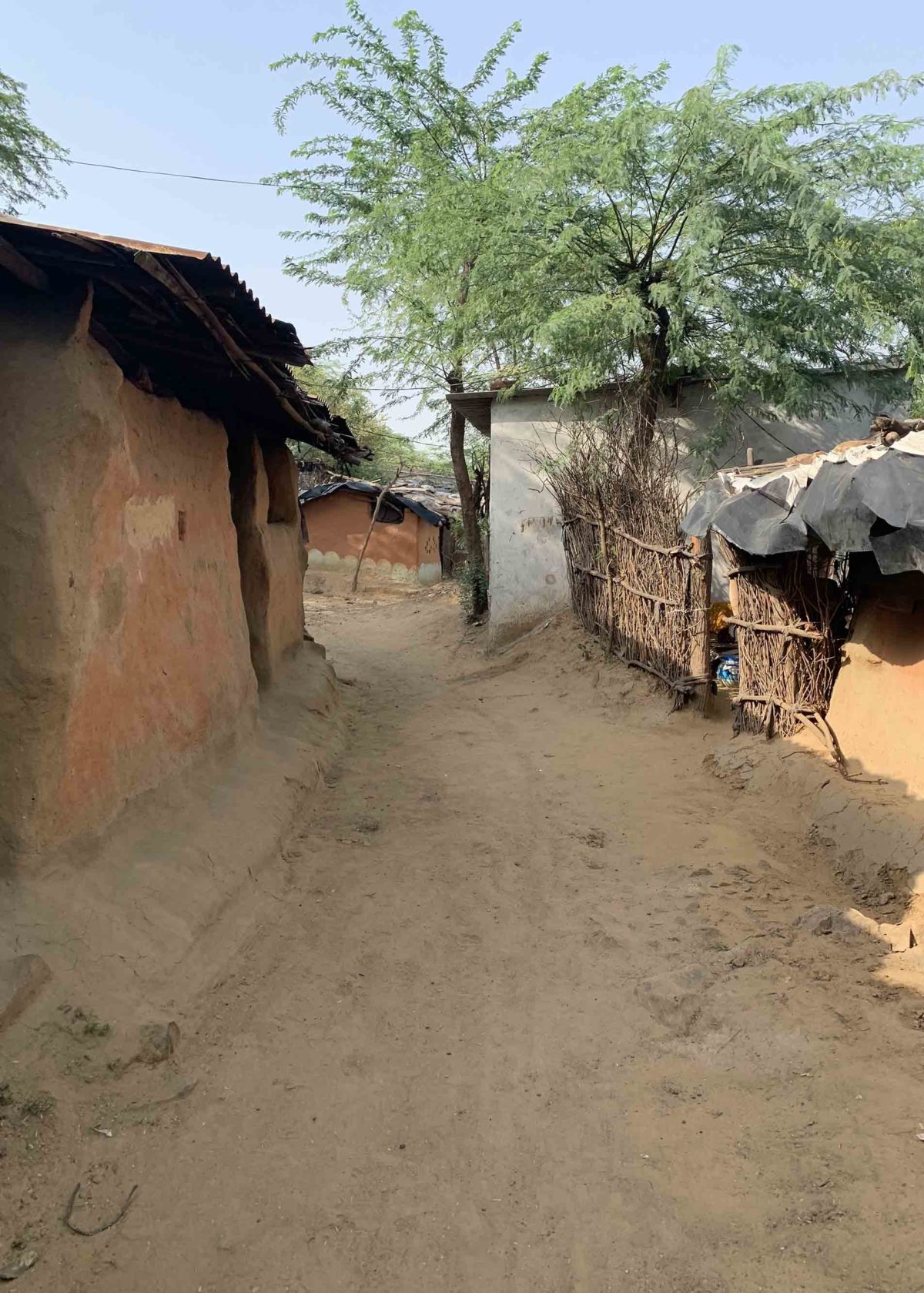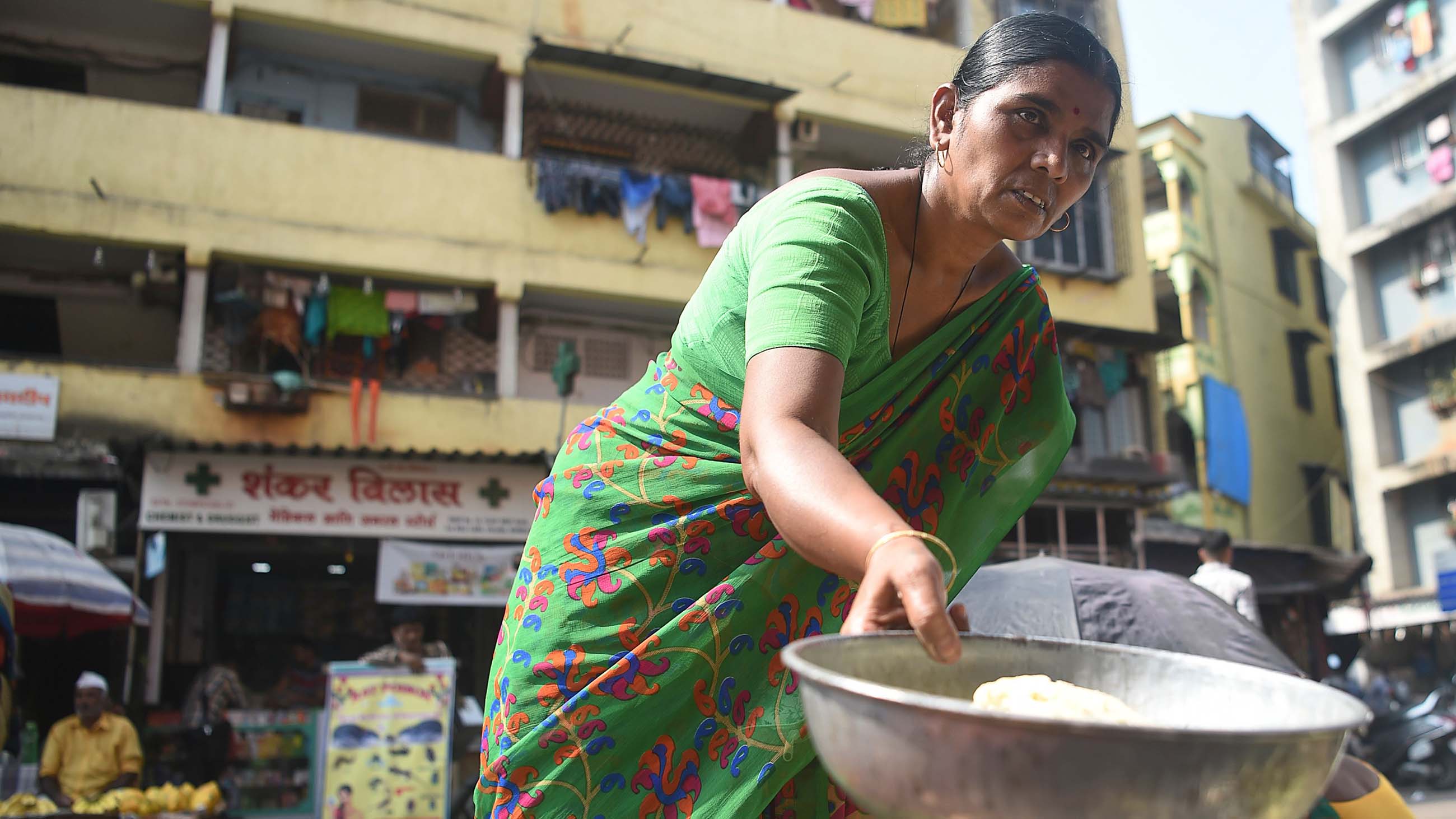Pandemic Brings New Hardships to India’s Domestic Workers
On a typical humid Sunday afternoon in July, Soni Tirki would be polishing off the chicken and rice that her mother makes every time the 20-year-old returns home. “I sit at ease and enjoy my meal,” Tirki says. “I eat however much I want. Nobody can stop me. Nobody can judge me.”
But on this Sunday, she has come to a village on the outskirts of New Delhi to join around 20 other women to discuss issues they have faced during the Covid-19 pandemic. As live-in domestic workers, the women rarely get a chance to step out of their employers’ homes; in fact, some expect to get an earful in the evening, but they say they don’t care anymore. After all, many of them say their salaries have been pending for several months. And, under the pretext of Covid-19 safety, their employers have further restricted the workers’ limited freedoms.
Although many of the women say they have always felt confined by their work, Covid-19 has given employers a means to justify restrictions, says Kavita Dang Rani, who works in a household in one of the several plush gated communities abutting the village, offering a stark contrast to the one-storied mud and brick houses where a few of the workers’ families live. Colorful pictures of Hindu gods adorn the outer walls of some of the one-room houses in the village.

The village where the July 2021 meeting took place. The mud houses offer a stark contrast to the high-rise gated residential communities that abut the settlement.
Visual: Romita Saluja
Tirki’s parents, she says, helped construct those communities. Now, she adds, “we are working inside these buildings like slaves.” She and many other laborers report working for 12 to 16 hours a day “with no more than two days of leave a month, eating leftovers from previous days and managing a dozen health issues that come from that.”
Official estimates suggest there are around 5 million domestic workers in India. But according to the International Labor Organization, an agency of the United Nations, the true number is somewhere between 20 million and 80 million. Most are girls and women from oppressed castes and communities, who migrate from poor or calamity-prone states, often to escape poverty and hunger. Once they arrive in big cities like New Delhi and Mumbai, many of them remain severely malnourished, says Anita Kapoor, an activist and general secretary at Shehri Mahila Kamgar Union, or Urban Women Domestic Workers’ Union, which helped convene the Sunday afternoon gathering. “Most young workers I work with have anemia,” she says.
While many of India’s domestic workers juggle multiple caregiving, cooking, and cleaning jobs, others are live-in, essentially on call every day of the week. In a big city like New Delhi, they earn around 10,000 rupees per month, or $130, for round-the-clock service to their employers. Even before the pandemic, most had virtually no legal options for reporting abuse or mistreatment.
Public health measures intended to fight the pandemic, workers and advocates say, have often made those conditions even worse. And policymakers have rarely taken domestic workers’ needs into account. “The entire discourse on sanitization, health, disinfection, again, comes from the perspective of a certain class,” says Neha Wadhawan, National Project Coordinator of the Work in Freedom program at the International Labor Organization. “I think workers’ perspectives are completely missing.”
Some human rights groups liken these conditions to modern-day slavery. “And now,” says Kapoor, “the pandemic has taken away whatever little liberties they had.”
India instituted nationwide lockdowns in March 2020. At the time, advocates worried that the public health restrictions would have devastating effects for vulnerable migrant workers. “We risk converting a health crisis into a socioeconomic crisis,” one activist told Science that month.
Indeed, with the sudden announcement of the lockdown, millions of migrant workers were stranded miles away from their homes. Many part-time workers lost their jobs. And some live-in domestic workers found themselves trapped with abusive employers for months.
As the pandemic has dragged on, workers say, conditions have remained poor. All 10 workers interviewed for the story, working in and around New Delhi, say they are being made to work overtime during the pandemic, with no additional compensation or benefits.
“We are working almost 24-7 now, as most of the household members are working from home,” says Tirki. “During the lockdown, they would have house parties, while we would keep up all night to make them snacks, serve them drinks, and do the dishes.”
Citing the risk of infection, employers have increased restrictions on movement since the pandemic, preventing workers from seeing their families and friends as often as they wish. “They say that until you are fully vaccinated, you are not allowed to leave,” Dang Rani said during the July meeting, before vaccines were available to most people in India. “I am so scared that I can’t even sneeze in front of them. I have to rush to the bathroom. If they hear it, they might think I am sick and remove me from the job.”
Another worker, Lakshmi Kumari, says she was fired from her job when she left the household to see the family of a dead friend. “I had left for just one hour,” she says. “When I came back, they said they don’t need me anymore.” The 21-year-old, who says she is not allowed to use her phone while working, was also forced to provide care to her Covid-positive employers. “When they tested positive, my mother urged them to give me a leave and send me home,” she says. “But they said they had brought me medicines when I had a fever and I would be selfish to leave them during their difficult times. So I stayed.”
Before the pandemic, many workers reported rampant caste-based violence in the workplace. Upper-caste employers required live-in workers to use separate utensils, or barred them from entering the family’s place of worship. According to the workers, they have strict instructions to only use the elevators designed for them — or to use the stairs if the elevators are out of order, even if the employers’ apartment is on the 20th floor.

Soni Tirki wants to quit her job as a domestic worker to be able to go to school or pursue a career in dancing.
Visual: Romita Saluja
A 2021 report by the International Labor Organization found that the pandemic has worsened these discriminatory practices under the garb of Covid-19 risk management. “A lot of domestic workers were made to do all the work from outside the house,” says Wadhawan, noting that they “felt extremely hurt that they’re expected to carry out the work — wash utensils, wash clothes — but their entry into the house is barred.” Such practices, she adds, reinforce traditions that treat lower-caste people as a source of pollution or impurity.
During the peak of the pandemic, many workers were “sanitized” using chemical sprays and pipes. Tirki says that she had developed an allergy and dark spots on her hands as a result of the chemical exposure. Other workers reported similar reactions to the disinfectants.
Asked about the chemical spraying, Chandrakant Lahariya, an epidemiologist working with the World Health Organization, says clearer official guidance could help to stop the ineffective practice. Public health agencies, he says, “need to categorically state what should not be done, while telling people what should be done.”
According to Kapoor, employers have increasingly withheld workers’ wages during the pandemic. Some employers also confiscate identification documents required for renting a house or buying train tickets, so they don’t escape. “The pandemic has been crippling for domestic workers,” she says. “The restrictions may have been necessary to contain the virus, but I have heard too many tearful stories of workers either being trapped or rendered penniless.”
Neither the Ministry of Labor and Employment nor the Ministry of Women and Child Development responded to repeated requests for comment on the impact of the pandemic on domestic workers.
At the root of these problems, some advocates say, is a years-long failure to implement basic labor protections for domestic workers.
The issues begin with the unregulated placement agencies that, according to the ILO, play a crucial role in pushing migrant women from historically marginalized communities into domestic work, while offering little transparency about salaries and working conditions.
“The 24-hour workers, in Delhi, most of them come through agencies,” says Elizabeth Khumallambm, national coordinator at the National Platform for Domestic Workers, a coalition of domestic workers’ unions and organizations in India. Many such workers, she says, are young girls, whose wages are either set through the agencies or between the employers and family members.
The market for these agencies has grown significantly in the past decade, says Hasina Kharbhih, founder and chairperson of Impulse NGO Network, which fights human trafficking in northeastern India. More and more young urban professionals are seeking domestic help. At the same time, entrenched poverty and climate-change-induced calamities are pushing potential workers toward cities.
Placement agencies see this kind of demand and jump in to fill the supply chain, Kharbhih says. While agencies that are registered with the government will provide data on domestic work, “there are also the mushrooming placement agencies that are actually not registered,” she says. In some cases, workers may be referred to families through their others in their communities. But without oversight, she asks, “who is doing the check of the credential of these families, who is doing the check of the extended families?”
For years, activists have pressed the government to regulate illegal agencies — and to implement other protections for workers.
In the past, policymakers have signaled their intention to pass such legislation. India is a signatory to the 2011 ILO Convention 189, an international agreement that aims to provide domestic workers with protection against harassment and abuse. The treaty requires the member countries ensure domestic workers know the terms and conditions of their employment, “preferably, where possible, through written contracts in accordance with national laws, regulations or collective agreements, in particular.” It also emphasizes the protection of these workers — but India has not ratified the treaty.
In 2020, the Indian parliament amended and consolidated old labor laws and passed the Code on Social Security with an aim to extend benefits like insurance, a retirement fund, and maternity assistance to laborers in some informal arrangements. But Khumallambm says it hasn’t done much for domestic workers, because individual households are not recognized as workplaces.
Recently, the government has taken steps to register domestic workers, potentially helping them get access to benefits and some protections. But, Khumallambm adds, it will all take time to yield results.
For now, many workers are stuck navigating a pandemic with few protections.
When Chhoti moved from her village to Delhi around six years ago, she did not imagine that she would be cleaning her employer’s toilet with her bare hands, with only a scrubber as her aid. She was barely 18 then.
After years of physical and mental abuse by various employers and agencies, Chhoti decided to quit. But the pandemic pushed her back after her husband lost his job and started beating her. “I preferred living with the abusive employers than see my husband make ruckus in the streets and then beat me up every night,” she says. Chhoti, who goes by only one name, often wonders if she will ever be able to get out of the system. “I am just too traumatized right now, too broken,” she says. “I hate it when random people call me on my phone and say, ‘Is this Chhoti Maid?’ Am I always going to be a maid?”
Meanwhile, Tirki, like other workers who spoke with Undark, says she would like to quit her job and never do it again. “I want to study.” She also wants to dance, she says, her eyes shining. “Full-time domestic work is such a lonely job. You live with them, you raise their children, but you are never a part of their family. You are always a maid, on your own, just all alone.”
Romita Saluja is an independent journalist covering gender, development, and human migration in India. This report was written and produced as part of a media skills development program delivered by the Thomson Reuters Foundation.










